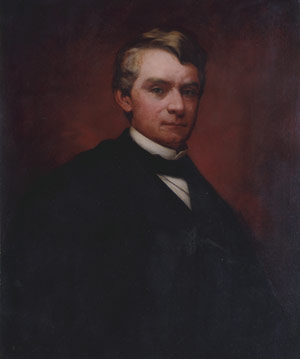Governor Andrew Gregg Curtin
Term
January 15, 1861 - January 15, 1867
Affiliation
Peoples Party (Coalition of Republicans,
Whigs, and Democrats)
Born
April 22, 1817
Died
October 7, 1894
 Photo courtesy of Capitol Preservation
Photo courtesy of Capitol PreservationCommittee and John Rudy Photography
Biography
Andrew Gregg Curtin was governor through one of Pennsylvania's darkest periods of history, the American Civil War. Governor Curtin rallied support for President Abraham Lincoln and the Union cause and helped solidify the key role that Pennsylvania played in preserving the Union. Born April 22, 1817, in Bellefonte, Centre County, Curtin was the son of Roland Curtin (1764-1830), a Scots-Irish immigrant iron founder, and his second wife, Jean Gregg (1791-1854), who was the daughter of a major Pennsylvania politician and president pro tem of the U.S. Senate, Andrew Gregg. The Curtins placed a high value on education for their seven children and young Andrew was sent to preparatory school, first in Harrisburg, then to the academy at Milton, an institution of exceptional reputation and operated by Rev. David Kirkpatrick.
Curtin next began the study of law with his mother's cousin, William W. Potter, and completed his studies in 1837 with Judge John Reed, founder of the Dickinson School of Law in Carlisle. Curtin's early career was the practice of criminal law in Centre County. In partnership with John Blanchard, Curtin immediately gained a reputation as an excellent orator and for his support of Whig presidential candidates. Curtin married Catherine Irvine Wilson on May 30, 1844, and they were the parents of seven children. In 1854, some favored the idea of Curtin running for governor, but Curtin declined and instead supported James Pollock. His first entry into public service was that of being appointed Governor Pollock's Commonwealth secretary and superintendent of Public Instruction. As schools superintendent he started the state system of teacher training in "normal" schools.
In 1860 Curtin was part of a "People's Party" comprised of Republicans allied with Whigs and Democrats who favored Republican policies of high tariffs, free public land, but were conservative on issues of slavery in order to avoid war. There was no question, however, that Curtin would place Pennsylvania squarely on the side of the Union. He defeated Democrat Henry D. Foster by thirty thousand votes just one month before Lincoln became president. He joined the newly formed Republican Party and shared its leadership in Pennsylvania with the wily iron master and U.S. Senator Simon Cameron (1799-1889), whose honesty and integrity Curtin would always question. Cameron had presidential aspirations, but saw Curtin's leadership as an obstacle to consolidating his political base. The chronic feud between the two continued after Cameron became Lincoln's Secretary of War in 1861.
The Civil War shaped the course of events, a course so arduous that Curtin endured a nervous breakdown. He willingly sponsored taxes to finance the war and cooperated in logistical, recruiting, and conscription measures, although he kept the state's debt low and bickered about certain state prerogatives attached to the massive units the state fed into the overall Union Army. In Harrisburg, more military units for the war were organized there than in any other Northern recruiting point, on an eighty-acre property named after the governor, Camp Curtin.
After Union military disasters dampened the popularity of the war and support for Lincoln was seriously slipping, Curtin organized "The Loyal War Governors' Conference" at the Logan House Hotel in Altoona, Blair County, in September of 1862. Although the conference was relatively informal, it buttressed the Lincoln administration and solidified Northern unity. Curtin's prime objective of raising morale among Northern states and support for the Union cause had been achieved. Although no reporters gained access and no formal record of the conference was kept, a position paper was delivered in person to Lincoln the day after the conference. Significant among the governors' recommendations was the replacement of the commander of Union forces, General George B. McClellan, which was ordered six weeks later.
Although in poor health, Curtin was reelected in 1863, defeating Democrat George Woodward by about fifteen thousand votes. His second term was consumed primarily by the logistical demands of the Civil War, but he became known as "The Soldier's Friend." He guided key efforts for the war through supplies, transport, support personnel, and the care of troops in the field, as well as establishing a system of state schools for war orphans after the war ended. Also, after the war, he led the repeal of the State Tonnage Tax, which helped the Pennsylvania Railroad become the nation's largest transport system.
After leaving the governor's office, Curtin was repeatedly called upon to lead reform factions of the Republican Party against the increasing power of boss Simon Cameron, but in 1869 Cameron defeated Curtin in a bid to serve in the U.S. Senate. As a consolation, President Ulysses S. Grant named Curtin Minister to Russia where he served until 1872 and then served Pennsylvania again as a delegate to the 1872-1873 state Constitutional Convention. Despite the appointment by President Grant, Curtin was not afraid to speak out against the corruption of the Grant administration and in 1872 supported Grant's opponent, Horace Greeley, for president. Curtin's final political service was from 1881 to 1887 when he served three terms as a Democratic congressman.
Curtin retired to his hometown of Bellefonte where he died October 7, 1894. After being honored as a hero and statesman by thousands who paid their respects in Bellefonte and escorted by military troops remembering his important role in the Civil War, Andrew Curtin was laid to rest there in Union Cemetery.
Pages in this Section
- 1790-1876
- Thomas Mifflin
- Thomas McKean
- Simon Snyder
- William Findlay
- Joseph Hiester
- John Andrew Shulze
- George Wolf
- Joseph Ritner
- David Rittenhouse Porter
- Francis Rawn Shunk
- William Freame Johnston
- William Bigler
- James Pollock
- William Fisher Packer
- Andrew Gregg Curtin
- John White Geary
- John Frederick Hartranft